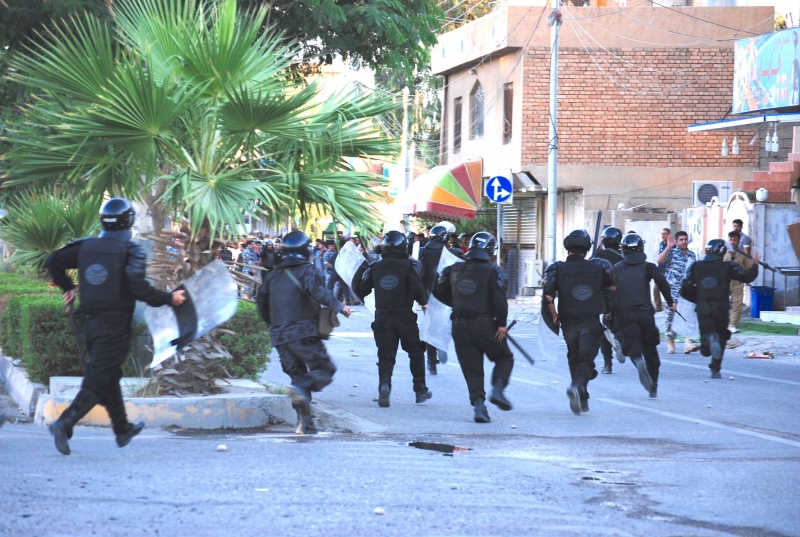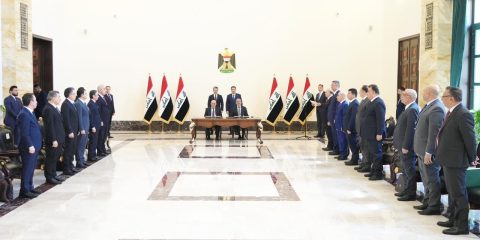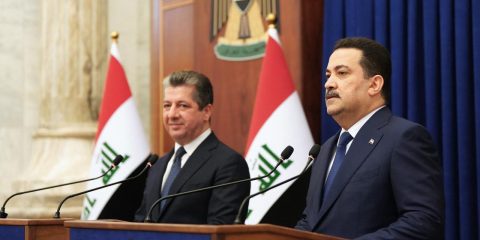KRG ruling party ejects rivals, escalating political crisis
Speaker of Parliament denounces "coup" as security forces loyal to Massoud Barzani's ruling KDP party block him, and other ministers, from the capital.
ERBIL - The Kurdistan Regional Government's (KRG) ruling party has begun using its control of security forces to unilaterally expel its most potent political rivals from government - dramatically destabilizing a region already roiled by war, economic crisis, and popular discontent.
Security forces answering to the Kurdistan Democratic Party (KDP) of Massoud Barzani, who continues acting as president after the expiration of his term on Aug. 19, prevented KRG Parliament Speaker Yousif Mohammed, a member of the rival Gorran party, from passing a checkpoint into the Kurdish capital of Erbil on Monday. KDP-aligned forces also barred Gorran ministers from entering government offices.
"An effort has been orchestrated as a military coup d'état against the Parliament, a legitimate institution," Mohammed said.
KDP leaders said they were reacting to a series of arson attacks on their party offices in Sulaimaniya province over the weekend, in which six people were killed. In a statement on Saturday, the KDP politburo said the violent protests were "pre-planned by followers of Nashirwan Mustafa," the leader of Gorran.
"GORAN movement didn't abide by government formation agreement," said Hemin Hawrami, a politburo member and the head of the KDP Foreign Relations office, in a Sunday post on Twitter. "Acted against KRG, did riots, burned bases. Their ministers r no longer in Gov."
Gorran's four government ministers were barred from entering their offices Monday - at the ministries of Finance, Peshmerga Affairs, Trade, and Religious Affairs - according to media officials from each ministry. The KDP controls most of the security and police forces in Erbil, including those guarding government offices.
No KDP or KRG official has published evidence that Gorran – a moderate party that gained votes on a platform of anti-corruption and political reform – organized the attacks. Iraq Oil Report has attempted to contact several different leaders and spokespersons from the KRG and KDP for comment several times, but they have not responded.
The head of the Gorran bloc in Parliament, Birzo Majid, said the party "supports peaceful demonstrations by the people demanding their salaries but [does not] endorse violent protests."
The KDP also has not offered any legal justification for the ouster of Gorran's ministers. As a political party lacking a legislative majority - holding 38 of the 111 seats in Kurdistan's Parliament - the KDP theoretically does not have the authority to sack Gorran's ministers or the Parliament speaker without support from other MPs.
Every other major party in the region - including Gorran, the Patriotic Union of Kurdistan (PUK), and smaller Islamist and Christian parties - signed a statement condemning the KDP's move against Gorran.
"Today's unfortunate incident of blocking the Parliament Speaker from attending the Parliament is a serious threat that is not consistent with the struggles and sacrifices of the people of Kurdistan," the statement said. "It is a violation of the legitimacy of the Parliament, since the MPs, including the Parliament Speaker, are elected by the people of Kurdistan."
Yet Kurdistan's nascent democratic institutions convey relatively little power, largely because most of the region's military forces are still controlled by political parties. Security forces loyal to the KDP dominate its political strongholds in the western provinces of Dohuk and Erbil, while PUK forces predominate in Kirkuk and the eastern province of Sulaimaniya.
Gorran, which was founded by disaffected PUK leaders, has attracted supporters throughout Kurdistan but enjoys the most popularity in Sulaimaniya. Mohammed vowed to continue holding Parliament sessions in Sulaimaniya, during a press conference in which he was flanked by leaders of the PUK and Islamist parties that together control a parliamentary majority.
The end of power-sharing?
The Kurdistan region has enjoyed an unprecedented period of political stability since 2005, when the KDP and PUK forged a power-sharing agreement. Before that, the two parties presided over separate cantons that fought a civil war in the 1990s.
But the cooperation of the last decade began to unravel earlier this year as KRG leaders struggled and failed to contend with the end of Barzani's presidential tenure. Barzani's second term had already been extended by two years, in 2013, through a political agreement, and the KDP's rivals refused to grant another extension without winning significant concessions.
On June 23, Mohammed convened a controversial parliamentary session in which MPs approved a draft law that would have curbed Barzani's powers and made the presidency more accountable to the Parliament. In response, Barzani issued a statement in which he called the vote a "coup-like mechanism," and vowed not to respect any effort to marginalize him through majoritarian politics in Parliament.
KDP leaders have recently echoed that rationale in justifying the moves against Gorran.
"The head of the Kurdistan Parliament lost his legitimacy on June 23, and he has to leave," said Omed Khoshnaw, the head of the KDP bloc in Parliament, in a televised interview Sunday.
On Monday morning, KDP-aligned security forces prevented Momammed, the Parliament Speaker, from entering Erbil at a checkpoint on the road from Kirkuk, according to his secretary, Daroun Rahim, and a video of the incident broadcast on local news. Mohammed was due to hold a session of Parliament, and was travelling with five other Gorran MPs.
"On the afternoon of Oct. 11, 2015, the KDP's politburo used its representatives in the government and Parliament to inform the Speaker of Parliament and Gorran's ministerial team that they must not attend their places of work and leave our regional capital - Erbil," Gorran said in a statement Monday.
The KDP's decision appears to have been taken during a high-level meeting chaired by Barzani.
KDP affiliated security forces have also expelled two news networks from Erbil and Dohuk. According to a statement from the independent NRT TV channel “a group of armed personnel claiming to be Asayesh” raided NRT’s offices, arrested staff members, closed down the networks’ offices, and forced staff to leave Erbil province through the Dergala checkpoint into Sulaimaniya. KNN, a news channel run by Gorran, also said their staff had been expelled from Erbil. NRT said Monday the KRG had granted permission for them to return to work.
Social media services were also offline for several hours on Sunday morning in Erbil and Dohuk provinces. Newroz Telecom, a monopoly service provider affiliated with the KDP, claimed the outage was due to a "technical fault."
The chairman of the Kurdistan National Security Council (KNSC), Masrour Barzani, who is Massoud Barzani's son, said on Twitter that the attacks on KDP offices throughout Sulaimaniya province were "a deliberate plan by Gorran activists to incite hatred and violence." The council has not issued a formal statement.
"Everything is falling apart," said a parliamentary official from the Gorran party.
Financial crisis and popular unrest
The political conflict has been aggravated by a severe financial crisis that has caused the government to fall several months behind in paying civil servants, who compose the vast majority of the region's work force.
In recent months, citizens have been holding peaceful protests and government employees have gone on strike, especially in Sulaimaniya province. They have complained not only of unpaid salaries, but also poor services, political dysfunction around the presidency controversy, and allegations of corruption and financial mismanagement.
The attacks that erupted over the weekend appear to be a consequence of this simmering discontent. Although the KDP has blamed Gorran for inciting the violence, dozens of interviews with protesters, organizers, and eyewitnesses suggest the causes are more deeply rooted and float free of any particular political party.
In several towns, protesters have turned on all parties with equal disdain and demanded the offices of all political parties remove their flags. Organizers have also reported that protesters are so frustrated by the performance of their government that demonstrations have become difficult, if not impossible, to manage.
"After a while our protest shifted to being an uncontrollable crowd," said Salah Mirwaisi, media coordinator of the Kurdistan Teachers' Union in Garmian, speaking about a protest held on Saturday.
Party leaders in Sulaimaniya also admitted that they could not control the protests, leaving them in a political bind.
"If they turn their backs on the protestors, they will lose their popularity and their members," said one PUK insider, speaking of the dilemma facing the party's politburo. "They also can't lead the protests directly, because the protestors are mostly uncontrollable."
Teachers in Sulaimaniya received their July salaries from an office on the city’s main Salim street on Monday, according to Bakhtiar Hussein, a teacher there who collected his wages. But, he said, “We promise to continue to protest until we have received our August and September salaries, too.”
Patrick Osgood and Rawaz Tahir reported from Erbil. Mohammed Hussein reported form Sulaimaniya. Ben Van Heuvelen contributed from the United States.





